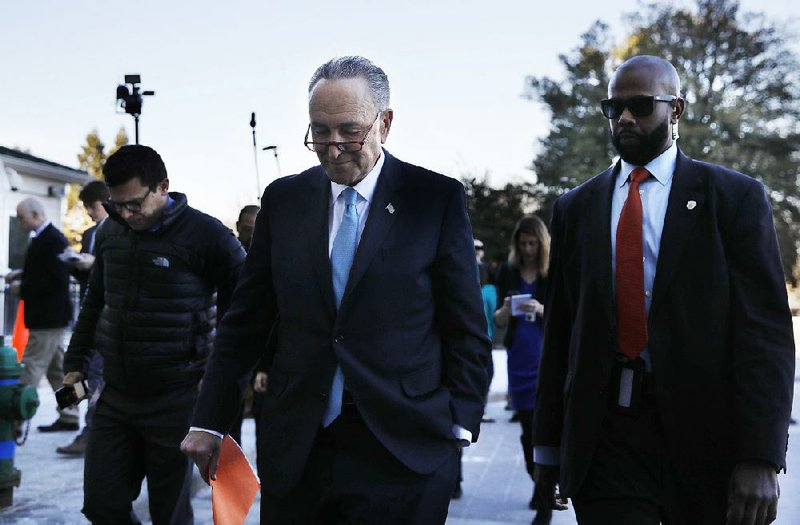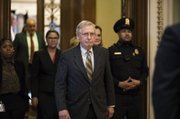WASHINGTON -- The federal government shut down at the stroke of midnight Friday, halting all but the most essential operations and marring the one-year anniversary of President Donald Trump's inauguration.
Last-minute negotiations crumbled as Senate Democrats blocked a four-week stopgap extension in a late-night vote, causing the fourth government shutdown in a quarter-century. Behind the scenes, however, leading Republicans and Democrats were already moving toward a next step, trying to work out a compromise to avert a lengthy shutdown.
Since the shutdown began at the start of a weekend, many of the immediate effects will be muted for most Americans. But any damage could build quickly if the closure is prolonged. And it comes with no shortage of embarrassment for the president and political risk for both parties as they wager that voters will punish the other at the ballot box in November.
Earlier Friday, Sen. Charles Schumer of New York, the Democratic leader, declared that progress had been made in a private meeting with the president at the White House.
After hours of private meetings and phone calls, the Senate scheduled its late-night vote on a House-passed plan. It gained 50 votes to proceed to 48 against, but 60 were needed to break a Democratic filibuster. A handful of red-state Democrats crossed the aisle to support the measure rather than take a politically risky vote in opposition. Five Republicans voted in opposition.
In an unusual move, Senate Majority Leader Mitch McConnell allowed the roll call to exceed 90 minutes -- instead of the usual 20 or so -- and run past midnight, seemingly accommodating the numerous discussions among leaders and other lawmakers. Still as midnight passed and the calendar turned, there was no obvious off-ramp to the political stalemate. Each party expressed resolve in its position -- and confidence that the other would suffer the wrath of voters.
"Not looking good," Trump tweeted shortly before the vote.
The stopgap measure would have kept the government funded through Feb. 16. In the Senate, Democrats were intent on withholding their votes until they secured concessions that would protect from deportation illegal immigrants brought to the country as children, increase domestic spending, aid Puerto Rico and bolster the government's response to the opioid epidemic.
After the vote failed, White House press secretary Sarah Huckabee Sanders said in a statement, "We will not negotiate the status of unlawful immigrants while Democrats hold our lawful citizens hostage over their reckless demands.
"When Democrats start paying our armed forces and first responders we will reopen negotiations on immigration reform."
After leaving the White House earlier Friday, Schumer told reporters that he and the president "had a long and detailed meeting."
"We discussed all of the major outstanding issues," he said. "We made some progress, but we still have a good number of disagreements. The discussions will continue."
Still, Trump did not appear able or willing to suggest his own solution. And Sen. John Cornyn of Texas, the No. 2 Senate Republican, said the White House chief of staff, John Kelly, had told him that "there were no agreements with Sen. Schumer."
"The president told him to go back and talk to Paul Ryan and Mitch McConnell and work it out," Cornyn said, referring to the leaders of the House and the Senate, respectively.
Senate Democrats had been holding out hope that Trump, having taken wide criticism for his vulgar, racially tinged comments on Africa last week, would be willing to make concessions.
"Republicans control the House, they control the Senate, and they control the presidency," said Sen. Patrick Leahy, D-Vt. "The government stays open if they want it to stay open, and it shuts down if they want it to shut down. It's time to stop kicking the can down the road and time to start negotiating in good faith."
Previous to the vote to end debate, each party prepared to blame the other for a shutdown.
On the Senate floor, Democrats delivered speeches in front of a placard that blared: "Trump Shutdown." But at the White House, Trump's budget director, Mick Mulvaney, said the Trump administration was preparing for "what we're calling the 'Schumer shutdown.'"
Sanders' statement said, "Senate Democrats own the Schumer Shutdown," adding, "This is the behavior of obstructionist losers, not legislators."
Tempers were flaring within the Republican Party as well. Sen. Lindsey Graham of South Carolina, a moderate on immigration who has been trying to broker a deal with Democrats, laced into Sen. Tom Cotton of Arkansas on Friday, deriding him as "the Steve King of the Senate" in an interview with NBC, a reference to the Iowa House member who is a virulent anti-immigrant voice in Congress.
Cotton, who has helped thwart Graham's negotiations, retorted with a reference to Graham's failed 2016 presidential bid.
"The difference between Steve King and Lindsey Graham is that Steve King can actually win an election in Iowa," Cotton told reporters.
Cotton went on to argue that it was the views of Trump on immigration that powered him to the Republican Party's nomination, while Graham was relegated to the "kiddie table" at the primary debates.
On Friday afternoon, Sen. John Boozman, R-Ark., took to the Senate floor and urged his colleagues to pass a continuing resolution.
"The idea of willingly facilitating a government shutdown is reckless, but unfortunately it appears that some of my colleagues prefer stalemate over robust debate," Boozman said. "We need to keep the government open and solve our differences through regular order, understanding and compromise. Governing by hostage in crisis does not not fulfill ... our moral and our constitutional duties to the American people."
PRODDING FROM HOUSE
Across the Capitol, House Republican leaders had pressured Senate Democrats to capitulate and give their blessing to the stopgap measure.
"Make no mistake about it: Senate Democrats are the only ones standing in the way of a fully funded government and a reauthorized health insurance program for children," said Ryan, R-Wis. "This is no time to play politics and force a shutdown. The House has done its job."
House Republican leaders told their members late Friday morning that they could go home, but advised them to "remain flexible" in case the Senate reached a spending agreement and sent the House a spending bill. Democrats called the move irresponsible.
"We should stay here and be prepared to act at a moment's notice," said Rep. Dan Kildee, D-Mich.
Trump canceled a trip to his Florida resort on Friday and planned to stay in Washington until a spending bill is passed, a White House official said Friday.
In an early-morning Twitter post Friday, Trump put pressure on Democrats to keep the federal government open.
"Government Funding Bill past last night in the House of Representatives," Trump wrote. "Now Democrats are needed if it is to pass in the Senate -- but they want illegal immigration and weak borders. Shutdown coming? We need more Republican victories in 2018!"
McConnell warned that the Senate was "just hours away from an entirely avoidable government shutdown," and he placed the blame squarely on his Democratic counterpart, Schumer.
"This vote should be a no-brainer," McConnell said, "and it would be, except the Democratic leader has convinced his members to filibuster any funding bill that doesn't include legislation they are demanding for people who came into the United States illegally."
The stopgap bill, which passed the House by a vote of 230-197, would have kept the government open for a month, provided funding for the Children's Health Insurance Program for six years and delayed or suspended a handful of taxes imposed by the Patient Protection and Affordable Care Act.
The standoff on immigration dates back to September, when Trump moved to end a program from President Barack Obama's time in office called Deferred Action for Childhood Arrivals, which shields the young illegal immigrants from deportation. Democrats have been eager to enshrine into law protections for those immigrants.
At the same time, congressional leaders from both parties have been trying to reach an agreement to raise strict limits on domestic and military spending, a deal that would pave the way for a long-term spending package. So far this fiscal year, they have relied on stopgap measures to keep the government funded.
But negotiations have been fitful and grew only more charged last week after Trump referred to African nations as "s***hole countries." By Thursday, talks on those matters had produced little visible progress, and prominent House Democrats introduced a resolution to censure the president for his words.
The shutdown was the first since 2013, when tea party Republicans -- in a strategy not unlike the one Schumer is employing now -- sought to use a must-pass funding bill to try to force Obama to delay implementation of his marquee health care law. At the time, Trump told news and talk show Fox & Friends that the ultimate blame for a shutdown lies at the top. "I really think the pressure is on the president," he said.
Arguing that Trump's predecessors "weaponized" that shutdown, Mulvaney, Trump's budget director, said Friday that the budget office was directing agencies to work to mitigate the impact this time. That position is a striking role-reversal for the conservative former congressman, who was one of the architects of the 2013 shutdown over the Affordable Care Act.
ARKANSAS PREPARES
Arkansas officials began preparing for a possible federal shutdown in December, Duncan Baird, the state's budget administrator, told lawmakers Friday.
Speaking to the Arkansas Legislative Council, Baird said the state Department of Finance and Administration has visited with various agencies to gauge the impact of a federal shutdown.
He harked back to the last time the federal government shut down, saying agencies fell into three categories.
"There were those agencies that were able to continue their federally funded operation unaffected," Baird said. "There were those that had sufficient federal funds drawn down that they were able to continue for a short period time, and then there were those agencies that immediately upon the shutdown began to furlough employees.
"So we expect it to be very similar in this case if there was a federal shutdown."
At the same meeting, Paul Louthian, a finance department deputy director, added that the state is in the middle of a payroll period and agencies already owe their employees a week's worth of wages.
"I've instructed the agencies that I've talked to to go ahead and pull that money down today, if at all possible, so we'll have that money," he said.
Gov. Asa Hutchinson in a Friday memo instructed state agency directors to determine which federally funded programs should be suspended and which employees furloughed in case of a federal shutdown, while still ensuring the continuation of vital services.
Programs and employees supported in part or in full by federal funds will be suspended or furloughed Monday if those federal funds are no longer available, the memo said. The only exceptions would be for programs or employees if "protection of the public health, safety and welfare would be compromised, as determined by the agency director in consultation with the Department of Finance and Administration and the Office of the Governor."
Information for this article was contributed by Mike DeBonis, Ed O'Keefe, Erica Werner and Elise Viebeck of The Washington Post; by Sheryl Gay Stolberg and Thomas Kaplan of The New York Times; by Laura Litvan and Sahil Kapur of Bloomberg News; by Zeke Miller, Andrew Taylor, Alan Fram, Jill Colvin and Catherine Lucey of The Associated Press; and by Hunter Field and Frank E. Lockwood of the Arkansas Democrat-Gazette.
A Section on 01/20/2018

